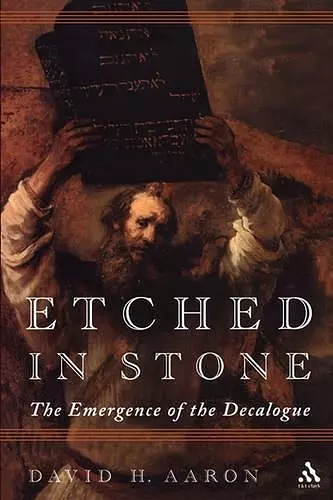Etched in Stone
The Emergence of the Decalogue
Format:Paperback
Publisher:Bloomsbury Publishing PLC
Published:1st May '06
Currently unavailable, and unfortunately no date known when it will be back

An approach to the questions of when and why the Decalogue texts were written as well as a comprehensive approach to methodological issues that contribute to our understanding of the composition of the Decalogue.
Examines the question of when the Decalogue versions were written and why. This book argues that the inclusion of the Decalogue texts was quite late in the development of the Pentateuch's canon, and that their integration preserves vestiges of highly charged ideological conflicts that were inadvertently neutralized.The document known as The Ten Commandments, more formally referred to as The Decalogue, remains among the most controversial and complicated passages in the Hebrew Bible. Even today, the twentieth chapter of Exodus continues to serve as a major religious and ethical icon within popular culture and religious communities, despite its many unexplained elements. Lawsuits over the display of Decalogue Tablets have occupied courtrooms in more than half the states of this country. And yet, few people understand that there is not one, but three versions of what are usually called The Ten Commandments. Moreover, when their ideological underpinnings are examined closely, these versions prove to be quite antithetical to one another. Even fewer are aware of the probability that these documents were written very late in the history of biblical literature - indeed, so late as to constitute a literary afterthought in the development of Israelite ethnic self-definition. In "Etched in Stone: The Emergence of the Decalogue Tradition", Aaron examines the question of when the Decalogue versions were written and why. The main focus of this book is the literary phenomenon known as 'the tablets' and how it functioned within the broader narrative. Aaron argues not only that the inclusion of the Decalogue texts was quite late in the development of the Pentateuch's canon, but that their integration preserves vestiges of highly charged ideological conflicts that were inadvertently neutralized by the rather bland and generic ethical precepts coined among its verses. "Etched in Stone" provides a paradigm for merging a variety of critical methods (source criticism, tradition criticism, ideological criticism, redaction criticism) and literary approaches that have heretofore been under-explored. In this sense, "Etched in Stone" will be read by scholars for its far-reaching conclusions and used by students (undergraduates, seminary, graduate) for learning approaches to the sequencing of biblical materials.
"well-structured...Aaron's in-depth intertextual investigation into the origins of the Decalogue is...suited to scholars." -- Jeremy Corley, University College, Durham, Scripture Bulletin
"By his own admission, his method of investigation is hybrid, including literary criticism, cultural criticism, historical criticism, and prominent among them all, ideological criticism. In his approach he engages "counterhistories," versions that were not accorded orthodox status, believing that they reveal much about the process of tradition development. Though meticulous in its approach, the book is quite readable. The serious Bible student will find it very challenging." - Dianne Bergant, The Bible Today, May /June 2007 -- The Bible Today
"The work itself is a solid, academic study of the date and authorship of the versions of the Decalogue found in the Hebrew Bible....The book was an enjoyable, and informative read. The style is pleasant, detailed, academically responsible, but never patronizing or overwhelming. Given the innovations offered, and the methodological limitations the author set himself in the study, the book is worth reading."- T.R. Hobbs, Journal of Hebrew Scriptures, Vol. 7 2007 -- Journal of Hebrew Scriptures
"Etched in Stone traces the literary evolution of the Decalogue and shows that the use of the tablets as symbols for Israel's covenant with God is a late literary adaptation of earlier attempts to write so impressive a scene. Through painstaking textual analysis, Aaron leads the reader through dozens of sources, each of which sheds light upon the emergence of the Decalogue as the Pentateuch's most dramatic and emblematic narrative scene." - David H. Aaron is Professor of Bible & History of Interpretation, Hebrew Union College - Jewish Institute of Religion, Cincinnati -- David H. Aaron
"This study articulates a clear and carefully constructed critical methodology and then brilliantly applies it to a central problem in biblical studies, the origin of the Decalogue. While one may not accept all of its arguments and revolutionary conclusions, the serious Pentateuchal scholar will be challenged to rethink his/her previously held views in a very stimulating way."--John Van Seters, professor emeritus, University of North Carolina, Chapel Hill -- John Van Seters * Blurb from reviewer *
Popularly venerated as a modern 'creed of ethics', an 'image of moral stability', the Decalogue emerges from Aaron's book as a postexilic literary creation. Far from an simple iconoclastic exercise, David Aaron has produced a sophisticated model of historical analysis that also owes a great deal to literary theory, and that methodically moves through a range of issues, carefully building the case for a specific date and meaning+in the course of which he illuminates nearly every corner of Pentateuchal research. Philip R. Davies, University of Sheffield, England -- Philip Davies * Blurb from reviewer *
ISBN: 9780567029713
Dimensions: unknown
Weight: 630g
368 pages